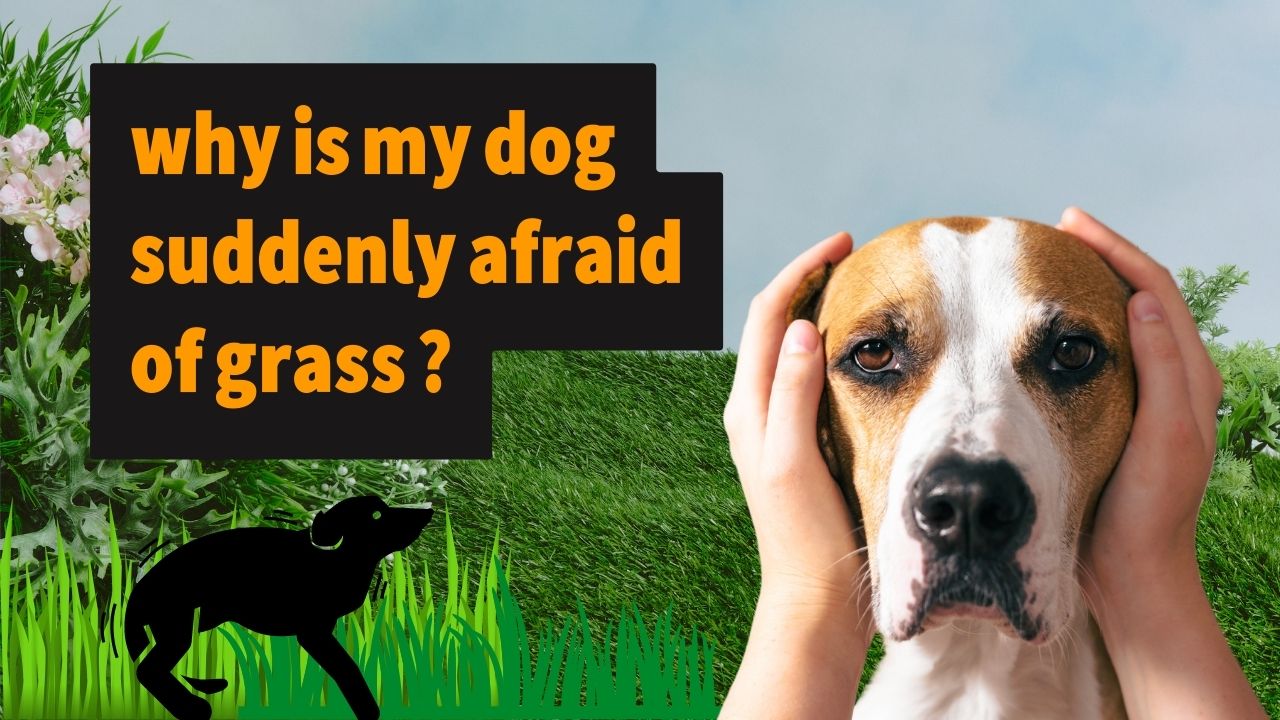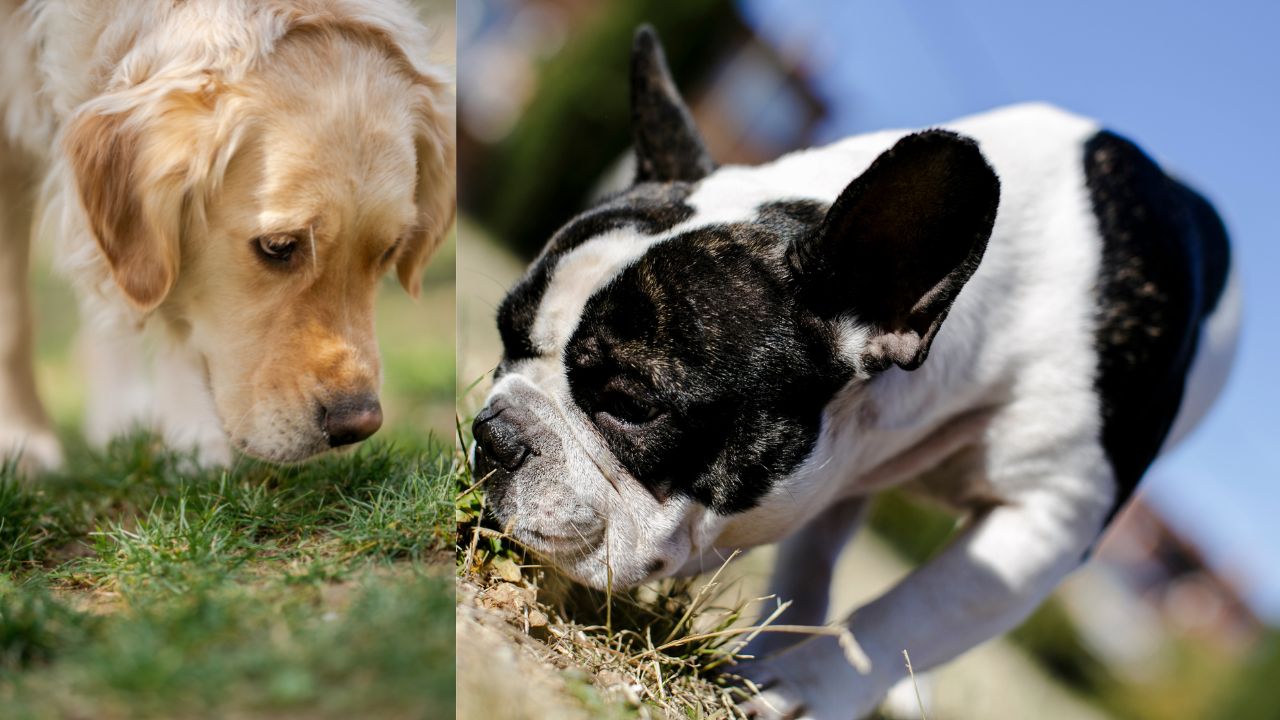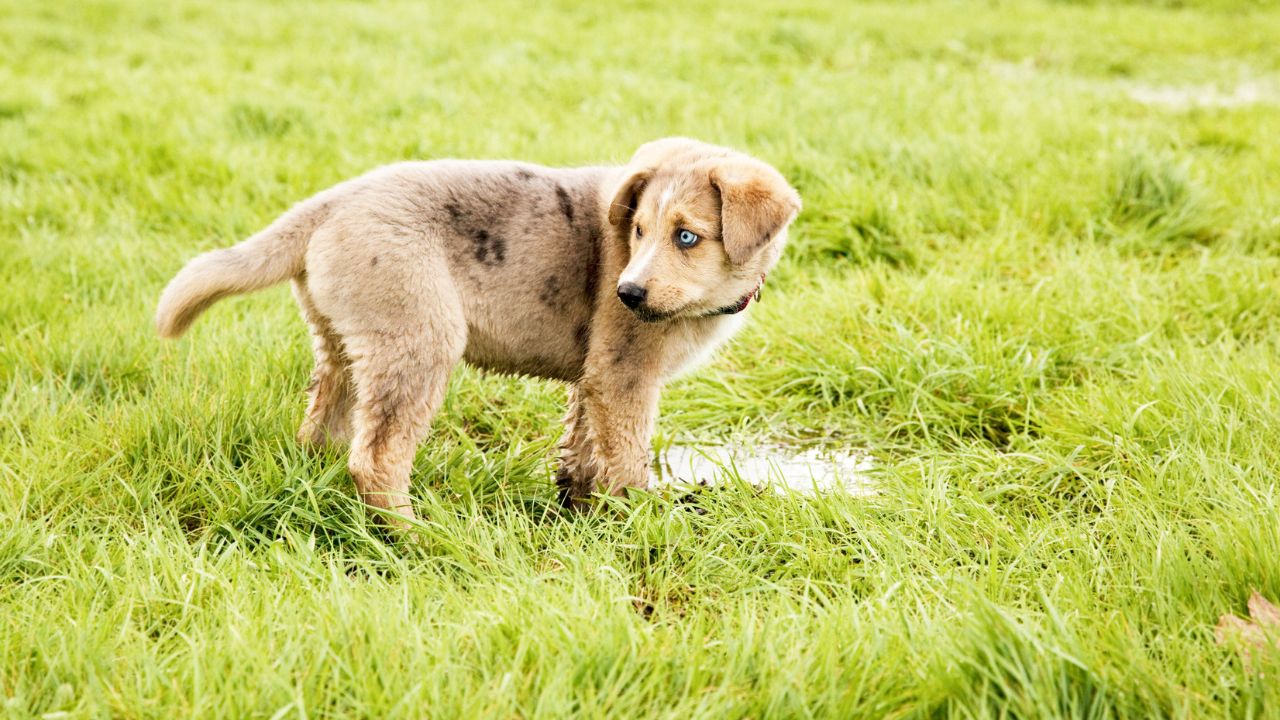
Why is my dog suddenly afraid of grass? Your beloved dog has been going outside and using the grassy areas of your yard as his bathroom, but now he’s suddenly afraid of grass? Does it seem strange to you, too? There are several different reasons why your dog could have suddenly developed this fear, from health problems to trying to stay away from specific kinds of dogs or people. In this article, we’ll cover 10 possible reasons your dog might be afraid of the grass and explain how you can help him get back to normal.
1. They associate it with pain
Have you ever walked barefoot on a lawn and gotten grass seed in your toes? Ouch! That’s why it hurts. If your dog has had a bad experience with grass, he might associate it with pain. Maybe he stepped on some sharp objects, burned his paws, or cut his feet open, and now every time he sees grass, he thinks it will hurt him. He remembers being hurt by something on the grass, so now, every time he sees green blades, they’re an omen of pain.
2. They associate it with negative experiences
Most animals, humans included, learn to fear things through negative experiences. For instance, once injured or bitten by a rabbit, a dog may have learned to associate grass with pain. They see other dogs afraid: Your dog may have picked up on its owner’s fear of grass. Animals follow our lead and do what we do—good and bad behaviors can be contagious.
3. Stress
Dogs are creatures of habit, so if they aren’t feeling well or something has changed in their lives, they may react differently to activities and items that were once commonplace. Are you or someone in your family ill, stressed out at work or school, or facing a difficult life change such as a divorce? Dogs can pick up on subtle cues from their owners and other people around them; it’s essential to ensure everyone else in your household is feeling good too. Some dogs who’ve lost a companion animal friend may suddenly start avoiding grass for similar reasons.

4. They are protecting themselves
Just like people, animals have fears and phobias. Though it’s natural for dogs to urinate or defecate on grass, not all dogs feel comfortable doing so when people are around. Suppose you think your dog feels intimidated by people watching them go to the bathroom outside (for example, a neighborhood kid). In that case, they may start becoming fearful of grass—and anything else that makes them feel insecure. This can lead to isolation and other destructive behaviors if left untreated.
5. Developmental reasons
So your dog was born deaf. Or maybe he was born blind or with only one leg. Perhaps he lost his vision and hearing after an illness or accident. How does that impact a dog’s ability to walk on grass without falling and freaking out? Well, it depends. If a dog can see fine, he’ll notice if there’s grass under his feet when he first starts walking–and then get used to it over time as it doesn’t cause any issues. But dogs who are blind won’t notice–they’re just taking baby steps at random since they can’t see where they’re going!
6. Health reasons
Hypothyroidism and hypoadrenocorticism are two conditions that might make your dog frightened to go outdoors. In addition to causing dogs to develop other behavioral problems, including sudden fear of grass or separation anxiety, thyroid disease can affect a dog’s appetite and sleeping habits. Hypothyroidism is a condition where a dog doesn’t produce enough hormones. As a result, they suffer from weight gain, lethargy, and hair loss. Dogs suffering from hypoadrenocorticism don’t have enough cortisol and epinephrine in response to stress or physical activity. The lack of these hormones can lead to weight gain and an irregular heart rate and blood pressure.

7. Change in diet
It’s possible that something as simple as a change in diet could be responsible for your dog’s fear. Dogs can develop grass allergies or food sensitivities just like humans. If you’ve recently switched your dog from commercial dog food to a home-cooked diet, it could be making him sick and causing stomach pain or even diarrhea. While he’ll eventually adjust, in some cases, dogs will develop an aversion to foods they’re sensitive to, including grass. Pay attention to his stool: does he go often but have a little result? Does it come out in tiny pellets rather than firm stools? These things point towards digestion problems which could make him less inclined to eat his kibble or take him off its usual schedule — two significant stressors for any pet owner!

8. There’s something wrong with the lawn or garden
First, check to see if there’s anything about your yard or garden that might be causing your dog’s fear. If you’ve just reseeded your property, he could associate it with those painful garden injuries kids get when they run barefoot on freshly turned earth. Also, ensure that any fertilizers or chemicals haven’t gone wrong and aren’t making their way into Fido’s mouth while he roams around. These tastes remind him of grooming time at home—you mistreated him using a wire brush to clean his teeth. (See below.) Finally, some dogs are more sensitive to pesticides than others, and even small amounts can cause an adverse reaction (i.e., poop aversion).
9. Illness
It could be that your pet has a sudden sensitivity to grass. Pups with an ear infection, urinary tract infection, or other illness might experience pain or discomfort when walking on grass. In these cases, skip exercise for a few days and look for symptoms of discomfort such as painful yelps or whines, cringing, and hiding in pain. If your dog doesn’t appear to be in distress after two or three days (and has no other symptoms), you can try taking her out into a small area of grass again. Perhaps it was just a one-time sensitivity from being bitten by bugs — that happens! Still, keep an eye out for odd behavior and stop if you see any indications that she’s hurting again.

10. Environment change
Dogs that are super excited to go outside and do their business might be afraid of grass because they aren’t used to it. If you’ve just brought home a dog from a shelter, or your dog has never been outside before, he may not know how to handle grass. When dogs walk on grass for the first time, they may notice something different about it, making them nervous. To help your dog get over his fear of grass, work slowly with him in short sessions. Make sure he doesn’t get too excited, so he doesn’t have an accident right away—but give him time to relax and make mistakes (or not). He’ll quickly pick up on what’s okay and what isn’t.
11) He gets negative reinforcement from other animals
If your dog has learned that specific behavior is terrible and punishes him for doing it, he may be afraid of doing that behavior again. For example, if your dog likes to play with other dogs on a leash but gets bitten every time he tries to interact with another canine, he’ll likely stop interacting with them entirely. Over time, he’ll become more and more reclusive and afraid of new things. This is why proper socialization is so important—it prevents terrible experiences from happening in the first place and teaches a dog what’s acceptable social behavior. So if your pup isn’t well-versed in basic doggy etiquette, teach him how to act around other animals before introducing him to big open spaces.

12) There are bugs in the grass
A dog’s vision isn’t as good as ours. Also, due to their placement on a dog’s head, they cannot turn their ears toward and track movement like we can with our eyes. In short, their field of vision is much more limited than ours, which makes it easy for dogs to run into something they didn’t even know was there. Perhaps your dog has run face-first into a bee or centipede hiding in some grass. Or maybe he knocked over a spider by accident; whatever it was might be enough to terrify your pup and keep him away from grass for life.
13) The grass makes his feet itch
If your dog’s afraid of grass, it may be because his paws itch after he walks on it. Usually, dogs scratch their feet to relieve itching, but if your dog is afraid to walk on the grass to get relief from an itch, he might associate walking on grass with that unpleasant feeling. Brush your pup’s feet and have him spend time in high-quality booties; also, try treating his paw pads for any bacteria or fungus that may be causing him discomfort. It’s also possible that something else has given your dog a rash after walking on grass—even a parasite like fleas or ticks!
14) The grass brings up memories of being punished or teased
Dogs are highly emotional creatures, associating smells, sights, and sounds with their feelings. For example, if a dog was made to stay outside while people were eating dinner inside, he may develop an aversion to being in that area. The sight of grass may remind him of those long nights alone outside and make him feel sad or anxious.
A similar effect can be seen in dogs who are punished for urinating on lawns or digging up flowers in someone’s yard. They learn to avoid that location because it is associated with pain (or at least unpleasant emotions). Dogs pick up on these emotions and associate them with what they see as things that trigger these uncomfortable feelings—in some cases, including grass.
15) He’s just being stubborn!
Many dogs don’t like grass for a straightforward reason: it hurts their feet. This is usually especially true for dogs with long, silky fur (like a Chow or Afghan) prone to tangling and matting. They may also feel unstable on grass since they aren’t used to having something soft under their paws. Allergies can cause a similar reaction; if your dog is allergic to pollen or plant matter, even just walking across a yard full of freshly-mowed grass can set off an uncomfortable sneezing fit! The same goes for chemicals like fertilizers and pesticides—even if you don’t see them sprayed in your yard, lawns near you could still be hosting toxic stuff.

